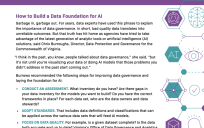The Federal IT Acquisition Reform Act (FITARA) scorecard tracks agencies’ progress toward meeting the Act’s requirements. Due to the addition of a cloud computing category on the scorecard, the latest round of FITARA grades, released in January 2024, showed a significant decline in agencies’ scores from prior years, with double the amount of “C” grades and three “D” grades for the first time since July 2022.
The addition of a cloud computing category reaffirms the federal government’s commitment to cloud migration. The government’s concerted effort to move to the cloud is due to its numerous and varied benefits.
Agencies that enhance their cloud capabilities will save critical costs associated with maintaining and managing data centers. Further cost savings can be realized with the cloud’s flexible scaling and automation tools. Moreover, the cloud offers flexible access to modern technologies, enables rapid innovations, and provides enhanced security, privacy, and compliance capabilities.
However, as agencies strive to keep pace with rapidly evolving technology and corresponding regulatory requirements, the support of trusted private-sector partnerships will be fundamental. To boost future FITARA scores and capitalize on the many benefits of cloud-based technologies, agencies must take swift action.
Overcoming Organizational and Technical Challenges
Despite the many advantages of cloud migration, there are several primary challenges that hinder agencies’ progress, as evidenced by the subpar FITARA scores.
Some prevalent challenges include a lack of organizational readiness, resource constraints, and continued reliance on legacy applications. Cloud migration is far more than a technical project; it is a transformation initiative that impacts every department and employee in an organization.
To overcome these hurdles, reap the benefits of cloud migration, and meet current FITARA requirements, agencies and their industry partners should consider the following solutions:
- FinOps (Financial Operations) — Forecast, report, and continuously optimize the cost of running applications in the cloud.
- OCM (Organizational Change Management) — Prioritize workforce and organizational readiness to ensure cloud adoption is frictionless and sustainable.
- AI-enabled Application Modernization — Accelerate the refactoring and rearchitecting of legacy applications to modern cloud-native applications with AI-powered automation.
- Zero-Trust Cloud Security — Implement comprehensive security controls appropriate for cloud services and cloud environments and leverage modern automation solutions for continuous compliance management.
For federal agencies with countless competing priorities, cloud migration can seem like a daunting task. Government agencies and their contractors need to focus on maximizing and sustaining the business value in cloud migration projects. It’s imperative that those involved in the cloud migration project on the public and private sector side understand the importance of a lifecycle approach in managing cloud economics, OCM, and service modernization.
By simultaneously focusing on the technical, strategic, and human aspects of cloud migration and operations, agencies can efficiently achieve their modernization goals and meet requirements such as FITARA, while remaining agile enough to accommodate ever-evolving technology advancements.
As Chief Technology Officer at DMI, Gary Wang is responsible for the strategy and development of DMI’s technology capabilities and delivering transformational digital solutions that improve business and mission outcomes for his clients. Gary has over 20 years of experience in leading strategy development, creating impactful innovations, and driving business growth. He was the winner of the 2020 FCW Fed 100 award for his work supporting multiple government agencies in achieving digital transformation by adopting cloud, DevSecOps, AI/ML, and advanced cybersecurity solutions. Gary Wang earned his Ph.D. degree from California Institute of Technology.





Leave a Reply
You must be logged in to post a comment.